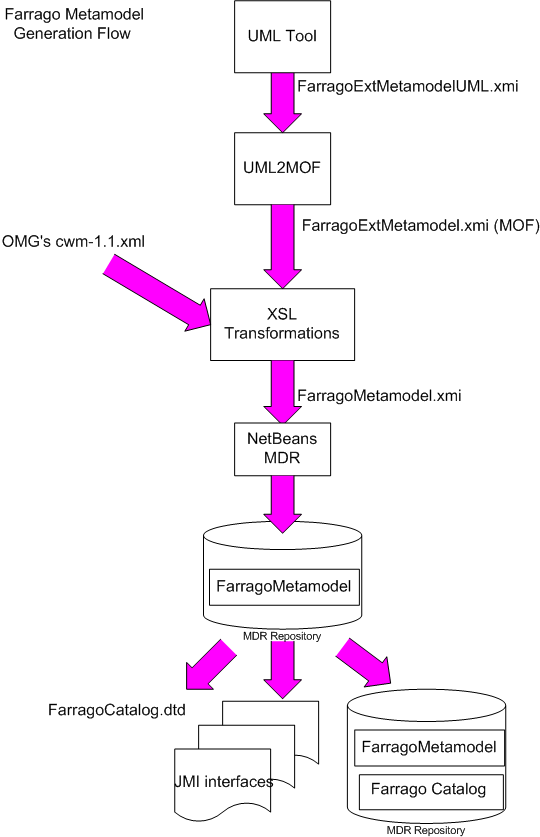|
|||||||||
| PREV PACKAGE NEXT PACKAGE | FRAMES NO FRAMES | ||||||||
See:
Description
| Interface Summary | |
|---|---|
| FarragoRepos | FarragoRepos represents a loaded repository containing Farrago metadata. |
| FarragoTransientStorage.TxnIndex | |
| FemSqltypedElement | This interface belongs in the UML model, but can't live there due to metamodel problems. |
| Class Summary | |
|---|---|
| FarragoAbstractCatalogInit | FarragoAbstractCatalogInit provides an abstract base class for classes that initialize the Farrago catalog. |
| FarragoCatalogInit | FarragoCatalogInit contains one-time persistent initialization procedures for the Farrago catalog. |
| FarragoCatalogUtil | Static utilities for accessing the Farrago catalog. |
| FarragoCatalogUtil.BackupData | Helper class used to represent backup information stored in the backup catalog. |
| FarragoCatalogUtil.RowCountStat | Helper class used to represent a specific type of row count statistic |
| FarragoColumnHistogram | FarragoColumnHistogram reads and interprets statistics for a column of a Farrago column set. |
| FarragoColumnHistogram.HistogramBarCoverage | Describes which points and ranges lie on a histogram bar |
| FarragoMdrReposImpl | Implementation of FarragoRepos using a MDR repository. |
| FarragoModelLoader | FarragoModelLoader is a utility class for loading the catalog model. |
| FarragoReposImpl | Implementation of FarragoRepos using a MDR repository. |
| FarragoReposImpl.ReposCache | |
| FarragoReposIntegrityErr | FarragoReposIntegrityErr records one integrity error detected by FarragoRepos.verifyIntegrity(javax.jmi.reflect.RefObject). |
| FarragoReposTxnContext | FarragoReposTxnContext manages the state of at most one repository transaction. |
| FarragoReposUtil | Static utilities for manipulating the Farrago repository. |
| FarragoReposUtil.ExportRefProvider | |
| FarragoReposUtil.ImportRefResolver | |
| FarragoReposUtil.InvalidXmlCharFilterInputStream | |
| FarragoReposUtil.InvalidXmlCharFilterInputStream.ByteOutputStream | ByteOutputStream extends ByteArrayOutputStream to provide ByteBuffer-like operations such as compact, array and get. |
| FarragoSequenceAccessor | A FarragoSequenceAccessor optimizes access to sequences. |
| FarragoSequenceOptions | A class for tracking sequence generator options. |
| FarragoTableStatistics | This class reads statistics for a Farrago table from data stored in the catalog. |
| FarragoTransientStorage | FarragoTransientStorage provides storage for transient MDR objects. |
| FarragoTransientStorage.MVIndex | |
| FarragoTransientStorage.PVIndex | |
| FarragoTransientStorage.SVIndex | |
| FarragoTransientStorageFactory | Factory for FarragoTransientStorage. |
| MockFarragoMetadataFactory | Mock implementation of FarragoMetadataFactory. |
| MockFarragoMetadataFactory.FactoryImpl | |
| MockMetadataFactory | Helps create a mock implementation of an MDR metadata factory interface. |
| MockMetadataFactory.JmiPrinter | Formats a JMI object as XML. |
| MockMetadataFactory.JmiVisitor | Abstract base class for an iterator over a JMI object and its children. |
| Enum Summary | |
|---|---|
| FarragoCatalogUtil.RowCountStatType | Enumeration of the different type of row count statistics |
| FarragoReposTxnContext.State | |
| FarragoSequenceOptions.OptionType | |
Implements the Farrago metadata catalog.
FarragoRepos takes care of starting up and
shutting down the repository, as well as exposing root packages and
providing utilities for querying and updating the catalog.

The first step of the catalog build is to combine the two models into a single XMI file before further processing. This requires a bit of XMI massaging; custom XSL scripts make this reasonably painless. (Since MDR uses MOF, we use the UML2MOF tool to convert FEM.) Some filtering is also performed; for example, Farrago only uses the following CWM packages:
Next, the combined metamodel is imported into a new MDR repository instance and stored in an extent named FarragoMetamodel. A singleton instance of this metamodel is instantiated with extent name FarragoCatalog; this will store actual catalog data.
Besides storage, model-specific Java interfaces are also required for
accessing the catalog at runtime. For example, a table is represented
by CwmTable. The build calls
MDR to generate these from the metamodel. The CWM interfaces are
generated under package net.sf.farrago.cwm, and the FEM
interfaces are generated under package net.sf.farrago.fem.
Custom code-generators in net.sf.farrago.catalog.codegen take
care of generating convenience class FarragoMetadataFactory and C++ code used for JNI
access to the model (TODO: link).
As shown at the bottom of the diagram, a DTD is also generated which describes the XMI format of catalog import/export data (all of which is implemented by MDR).
For more details on the build process, please study the createCatalog
target in //open/dev/farrago/build.xml.
Once the system is fully initialized, DDL statements executed by users
can also modify the catalog. The geneneric DDL implementation is in
net.sf.farrago.ddl. Specific validation and storage rules for
various catalog objects are supplied by DdlHandler.
| Revision | $Id: //open/dev/farrago/src/net/sf/farrago/catalog/package.html#9 $ |
|---|---|
| Copyright | Copyright (C) 2005-2009 The Eigenbase Project
Copyright (C) 2005-2009 SQLstream, Inc. Copyright (C) 2005-2009 LucidEra, Inc. |
| Author | John V. Sichi |
|
|||||||||
| PREV PACKAGE NEXT PACKAGE | FRAMES NO FRAMES | ||||||||